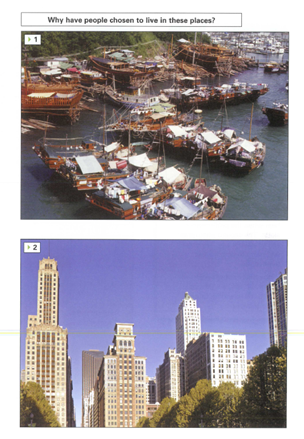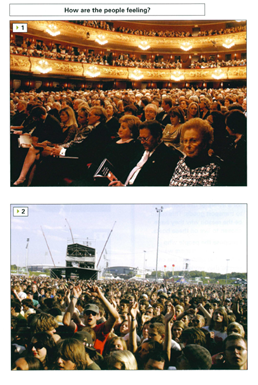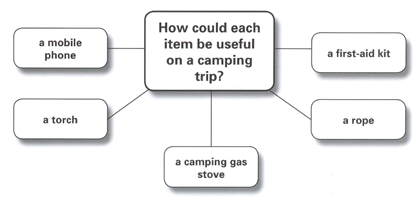Task 1
Answering personal questions briefly, giving personal information.
E.g.
Can you describe the area where you live?
What do you like and dislike about this area? (Why)
How do you think the area could be improved?
Where else would you like to live? (Why?)
Tips
- Try to sound natural. Don’t learn a speech by heart.
- Avoid answers which are too short or, on the contrary, too long and complicated.
Task 2
Describing 2 pictures for a minute.
+ answering a brief question connected with another candidate’s picture (30 sec).
E.g.
Look at the photographs which show different types of accommodation.
Compare the photographs and say why people have chosen to live in these places.

Additional question: Which of these would you prefer to live in?
Tips
- Say what the pictures have in common and how they are different. Use the appropriate vocabulary
E.g.
Both pictures show/depict …/ In both pictures we can see…
In contrast/on the contrary …,
… while/whereas …
- Use varied vocabulary and grammar structures for making guesses and describing action.
E.g.
Perhaps, probably, possibly
I guess/ suppose/ assume …
May/might/could + V1/be Ving/have V3
Seem/look + adj
Seem to V1/be Ving/have V3
See sb Ving (We can see some people applauding.)
Perhaps the people have chosen to live in the skyscrapers in a big city to be able to reach their workplace quite fast.
They might have chosen the skyscrapers to have the city centre within their reach.
Practice task
Look at the photographs which show people at concerts.
Compare the photos and say how you think the people are feeling.

Additional question: Which of these events would you prefer to go to?
Task 3
Discussing a decision-making task with another candidate.
E.g.
Imagine you’re going on a camping trip to the mountains. Look at the ideas for items you could take with you and a question for you to discuss. Talk to each other about how each item could be useful during the trip. Then decide which two of these you would take on your camping trip.

Tips
- Take active part in the discussion. You contribution to the conversation and that of your partner should be equal. Don’t forget to listen to your partner and ask what he/she thinks: What do you think? / Don’t you think we’d better …?
- Don’t make quick decisions, listen to your partners idea’s first and then make a decision.
- Use words and varied expressions for agreeing/disagreeing, such as I totally agree/ I’m afraid I don’t/can’t agree with you on that, etc.
- Use a wide range of grammar constructions, e.g.
Conditional 2: If we had a mobile phone, we could quickly ask for help if needed.
- Structures for making suggestions:Why don’t we V1?/ How about Ving?/ Let’s V1/ I suggest we V1/ Shall we …? , etc.
- Modal verbs: might/could/may/would/should V1: … although we might not have a connection if we were in a remote place.
- Linkers for objections: although, even though, despite, however, etc.
Task 4
Discussing topics related to the task in Part 3, answering questions
E.g.
Would you enjoy a camping holiday? (Why?/Why not?)
What other type of holiday would you enjoy? (Why?)
Would you prefer to go on holiday with your family or with a group of friends? (Why?)
What is the best time of year to go on a holiday? (Why?)
Is it usual for people in your country to visit other countries on holiday?
What’s a typical kind of holiday for someone in your country?
Tips
- Don’t interrupt your partner, let him/her finish.
- Don’t give one-word answers, like Yes/No. Answer in a few phrases, giving reasons to prove your opinion.